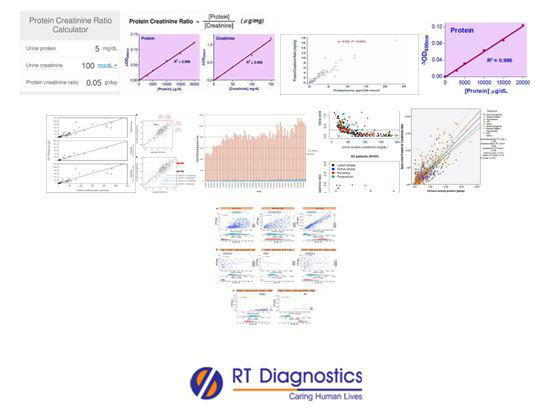Urine – Protein – Creatinine - Ratio:
Why Urine – Protein - Creatinine Ratio Test?
CLINICAL INFORMATION
Creatinine is a metabolic end-product formed by catabolism of the muscles' activity. It is formed by muscle metabolism (i.e break-down product of creatine phosphate or also called phosphocreatine and ATP from the muscle and protein metabolism) of our body. This creatinine circulates in the body and is excreted in urine by the kidneys. Creatinine levels can be increased in cases such as pregnancy, intense exercise, high red meat consumption, medications (ACE inhibitors) etc. The higher levels of circulating creatinine indicate certain pathologies including muscle disorders such as muscular dystrophy, reduced kidney function (acute infections), chronic kidney disease, polycystic kidney disease, dialysis, the prognosis for kidney diseases, congestive heart failure, diabetes mellitus, dehydration, hyperthyroidism, shock, autoimmune diseases, nephrotic syndrome, nephritis, glomerulonephritis, heavy metal toxicity, pyelonephritis, blocked urinary tract, heart failure, enlarged prostate, complications of diabetes, blockage of the urinary tract due to kidney stones, decreased blood flow to the kidneys (dehydration, diabetes and congestive heart failure), drug abuse and infections to kidneys such as post streptococcal glomerulonephritis, kidney damage or kidney failure etc. While low creatinine may be due to muscle loss, severe liver disease, malnutrition etc. This test is suggested in patients with symptoms like fatigue, muscle cramps, trouble sleeping, loss of appetite, lower back pain, changes in urine output and frequencies, high blood pressure, swelling or fluid retention, nausea and vomiting etc. Hence assessment of the kidney can be performed by renal function tests that include creatinine tests, BUN tests, Glomerular filtration rates, urine calcium-creatinine ratio, albumin/creatinine ratios etc. Proteins are large, complex molecules that have many key roles in the body (required for the structure, function, regulation of body’s tissue, organs etc. These proteins are made up of amino acids (building blocks). These major functions of proteins in the body include antibodies, enzymes, messenger, structural components for stability, transport, storage etc. Usually, these proteins are not excreted in the urine due to their high molecular weight. But during certain abnormal conditions and/or pathologies they tend to get excreted and are called as albuminuria or also sometimes referred to as proteinuria. Proteinuria is an indicator in certain pathologies such as deterioration of kidney functions, cardiovascular diseases etc and its risk of progression. Proteinuria also helps in the prognosis (monitoring patients on penicillamine). Spot urine Protein/Creatinine ratio test is helpful in the screening for the diagnosis of Immunoglobulin A nephropathy (IgAN) with proteinuria test result. This test is indicated in the evaluation of proteinuria (in children and kidney disorders) estimation, renal tubular disease, the prognosis of kidney function in renal pathologies, hypertension, gestational hypertension, pregnancies, preeclampsia, immunologic diseases (immune-mediated pathologies eg. autoimmune diseases – SLE etc), diabetes mellitus, multiple myeloma, acute kidney injury, renal calculi (kidney stones), UTI etc. Higher proteinuria levels are associated with UTI, kidney function, Diabetes mellitus, dehydration, Amyloidosis, medication causing renal damage such as NSAIDs, antimicrobials, diuretics, chemotherapy drugs, hypertension, preeclampsia, heavy metal poisoning, Polycystic kidney disease, congestive heart failure, glomerulonephritis, SLE, multiple myeloma, certain cancers like bladder cancer etc. Bleeding and inflammation in the urinary system can also elevate proteinuria levels. Some of the causes include disorders of the genitourinary or urogenital system, urinary bladder infection, stones in the urinary bladder, prostate pathologies in males, vaginitis (in females), cancers etc. High-risk factors for kidney disease include chronic Diabetes mellitus, hypertension, family history of kidney disease, overweight and/or obesity, old age etc. factors that may influence the test result include strenuous exercise, dehydration, antibiotics such as aminoglycosides, cephalosporins, penicillin, antifungal medications such as amphotericin-B, grisefulvinetc, NSAIDs, cuprimine (penicillamine for RA), salicylates to treat arthritis etc. Additional tests include symmetrical dimethylarginine (SDMA) test, imaging studies etc.

General Instructions:
Sample Requirement: Specimen - Urine Sample. Test Preparation: None.
NOTE - Sample for specimen collections may vary based on the patient’s condition/cases according to the patient’s presenting complaints/signs or symptoms:
SPECIMEN REQUIREMENT (Special or Rare Cases) - As instructed and guided by Physician / Clinician / Pathologist / as per Laboratory’s requirements, according to procedures and protocols.
This Multi-Specialty Clinical Referral Laboratory RT DIAGNOSTICS provides precise and accurate tests with an extensive range of testing services to the medical centres to help in the diagnosis and identification of pathology in the test specimens for infectious diseases and also to evaluate the function of organ systems of the patient. It prevents further complications and helps to stabilize and restore health to near normalcy at the earliest without delay.



